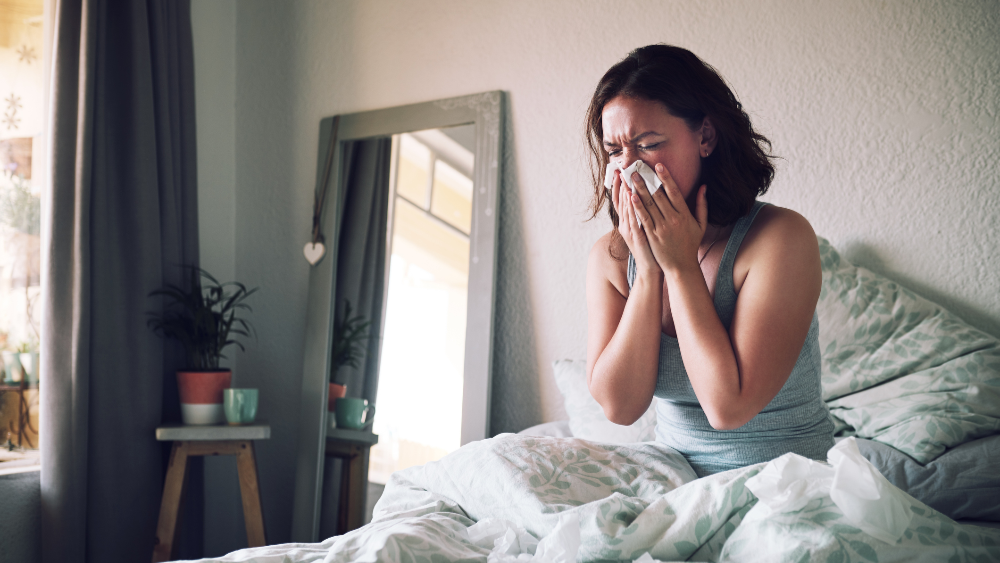
You probably recognize it:you are sick and drowsy, but you often can't sleep. Whether it's that cough or that runny nose, it takes a lot of effort to get to sleep when you're not feeling well. That is why we have listed 7 tips that will help you sleep better when you are sick.
When you're sick, the secret to a good night's sleep may lie in your thermostat. If you want to sleep comfortably, it is best to lower the temperature. A lower temperature can help you sleep more peacefully and get better REM sleep. Warm temperatures can disrupt your circadian rhythm by preventing your body from lowering your own temperature, causing restless sleep. A cold environment mimics the rhythm of your body temperature, which is also the natural rhythm that your sleep follows. The ideal temperature for a good night's sleep? Between 15 and 20 degrees Celsius if we are to believe the National Sleep Foundation.
When you're sick, you usually sweat more. This will make your sheets hold more bacteria. The best way to prevent bacteria from building up and maybe even infecting your partner? Change your bedding regularly. Changing your bedding at least once a week gets rid of excess bacteria and viruses that can live on cotton. If you have allergies or asthma, you will probably need to change your sheets more often due to the dust that can linger on your sheets and therefore cause symptoms.
A humidifier, also known as a humidifier, can help keep your airways moist and prevent irritation in your lungs. It also helps to reduce the transmission of the infection to your throat and dry nasal passages. In fact, a low humidity level makes your immune system less able to fight the flu, according to a study from 2019. So it's time to invest in a humidifier, because that way you fight against that dry cough that you have all the time. keeps you awake at night.
A humidifier isn't the only handy tool that can help you sleep better when you're sick. An air filter can also do wonders! An air filter can filter allergens such as house dust mites, animal dander and mold spores from the air in your (bedroom) room. These allergens can cause symptoms such as congestion, a runny nose, sneezing and sinus pain, which can make it more difficult to fall asleep or stay asleep. In addition, you cough into the air yourself when you are sick, which can also be filtered out of the air by the filter. Quite a good investment!
Getting a good night's sleep can be as simple as getting higher in your bed. When you lie flat, postnasal fluid and mucus can build up in your lungs and airways, irritating them and making you cough all night. Fortunately, there is an easy solution:elevate your upper body by placing an extra pillow under it. This allows gravity to do its job. By raising your entire torso – and not just your head – you help open your airways, allowing you to breathe easier and sleep better.
You might think that a double dose of flu medication before going to sleep will help you. But taking medicines together can actually sabotage your sleep and lead to serious side effects. Flu medications often contain several active ingredients, such as acetaminophen. When you take a cocktail of flu and cough tablets before going to bed, you may be taking too much of this pain reliever, which can cause liver damage. So make sure you always read the package inserts and choose a medicine with only one active ingredient. Ask the pharmacist or general practitioner which medicines you can take together.
Read also:'What a little extra sleep can do'
Magnesium is important for muscle and nerve functions, controlling your blood glucose level and regulating your blood pressure. But did you know that it can also help you sleep and has a positive effect on your immune system? In fact, a study from the December 2012 issue of the Journal of Research in Medical Sciences found that taking magnesium supplements significantly improved sleep duration and sleep effectiveness in participants who suffered from insomnia. Do consult with your doctor before taking a magnesium supplement, as it can interact with certain antibiotics and other medications.
Now from €1.99
To the digital kiosk
Source: Livestrong.com